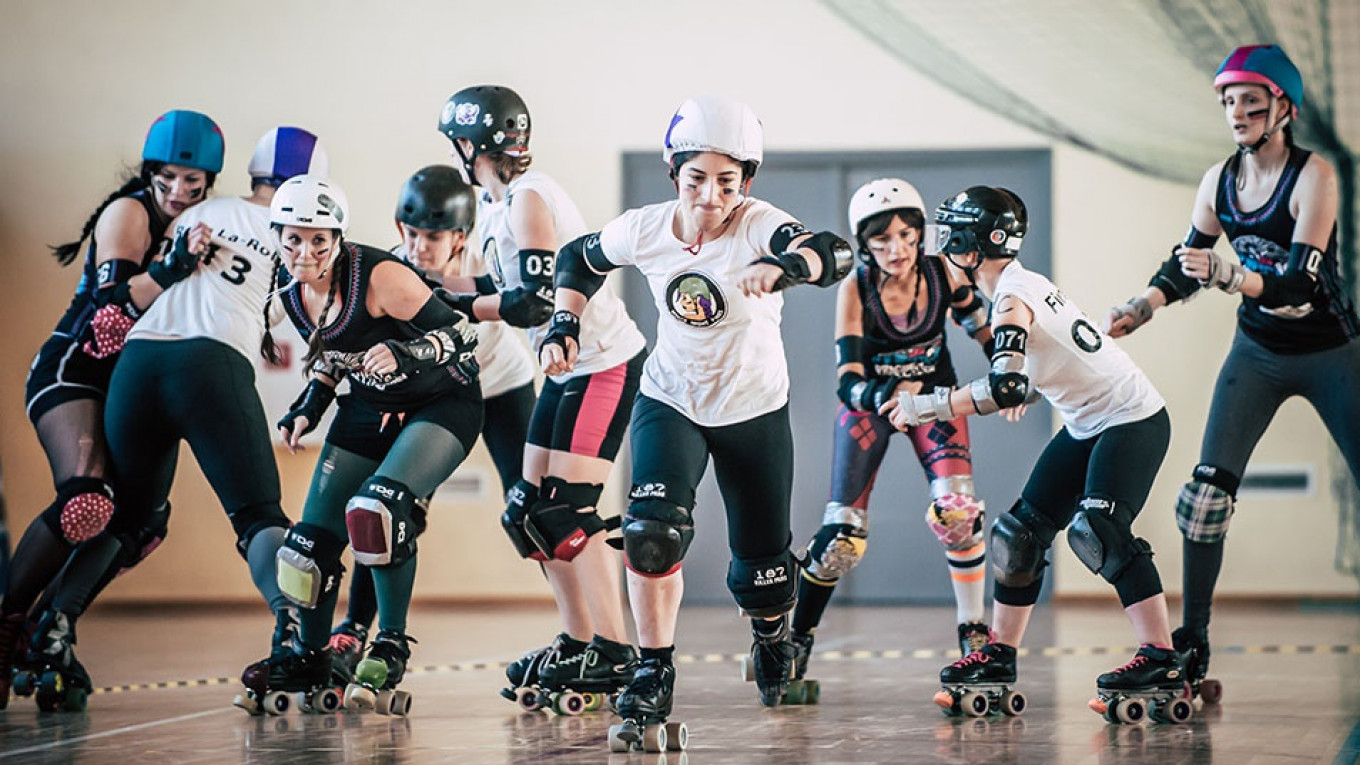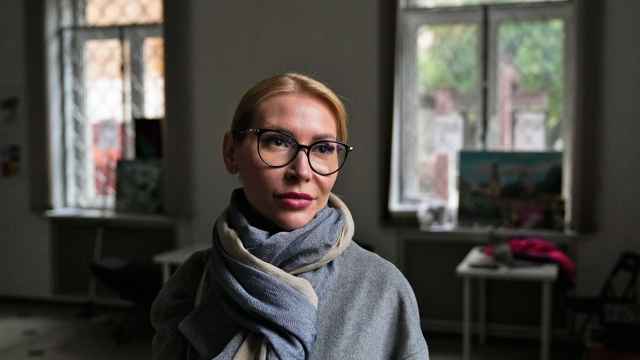On a chilly Sunday afternoon in late September, twenty women assemble in a gym in an industrial district in southwestern St. Petersburg. They flood the gray hall with colorful leggings, ripped T-shirts, bawdy banter and plenty of tattoos.
Zhanna Yuriyeva, co-founder of the St. Petersburg Roller Derby League, drops her jeans to show off her latest two, still raw from the night before. One reads “F-ck,” the other “Kill.” Her team howls with delight. This is roller derby, after all. No one is here to play nice.
Originally a skating race for women, roller derby evolved in the 1930s into an aggressive team racing spectacle, complete with hair-pulling and tripping. Since the 2000s, the sport has been regulated and players wear a full set of safety gear. Today, two teams skate around a track. The “jammers” — one designated racer in each team — score points by passing members of the opposing team.
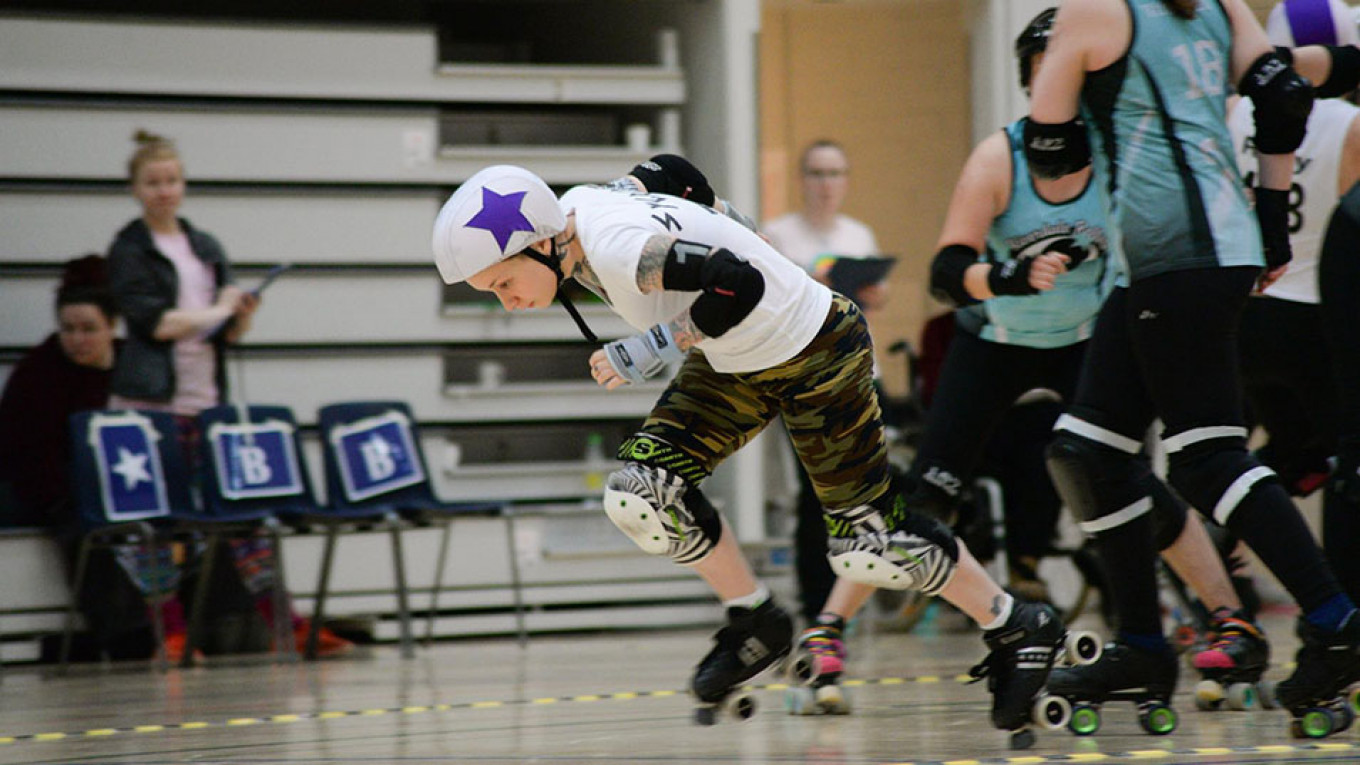
As the aggressive sport has attracted women keen on breaking down gender norms across the globe, it has become synonymous with an expression of women’s rights.
Overseas, the sport is moving beyond its mission of women empowerment and becoming more mainstream, but in Russia it has stayed close to the small and marginal feminist and LGBT communities.
Since 2013, two roller derby groups have emerged: a league in St. Petersburg has three teams, while Moscow is home to one. Many participants identify as outsiders in a society that insists on traditional gender norms, and say they have finally found a sense of belonging. "What’s most important is being yourself, and roller derby affords that,” Yuriyeva, 30, says.
On the fringes
With a lack of awareness about the sport in Russia, there are a number of obstacles that need to be overcome — beginning with finding a location. The Moscow team alternates between an indoor public skating rink in winter, and Sokolniki Park in better weather. Skating on a public track, however, means sharing a space with children and recreational skaters. It’s not ideal.
In St. Petersburg, Marya Mrakova, a founding member of the league there, had to “Google, and Google, and Google, and make lots of phone calls,” before she found the hall. “Everyone’s afraid you’ll damage their floors,” she says.
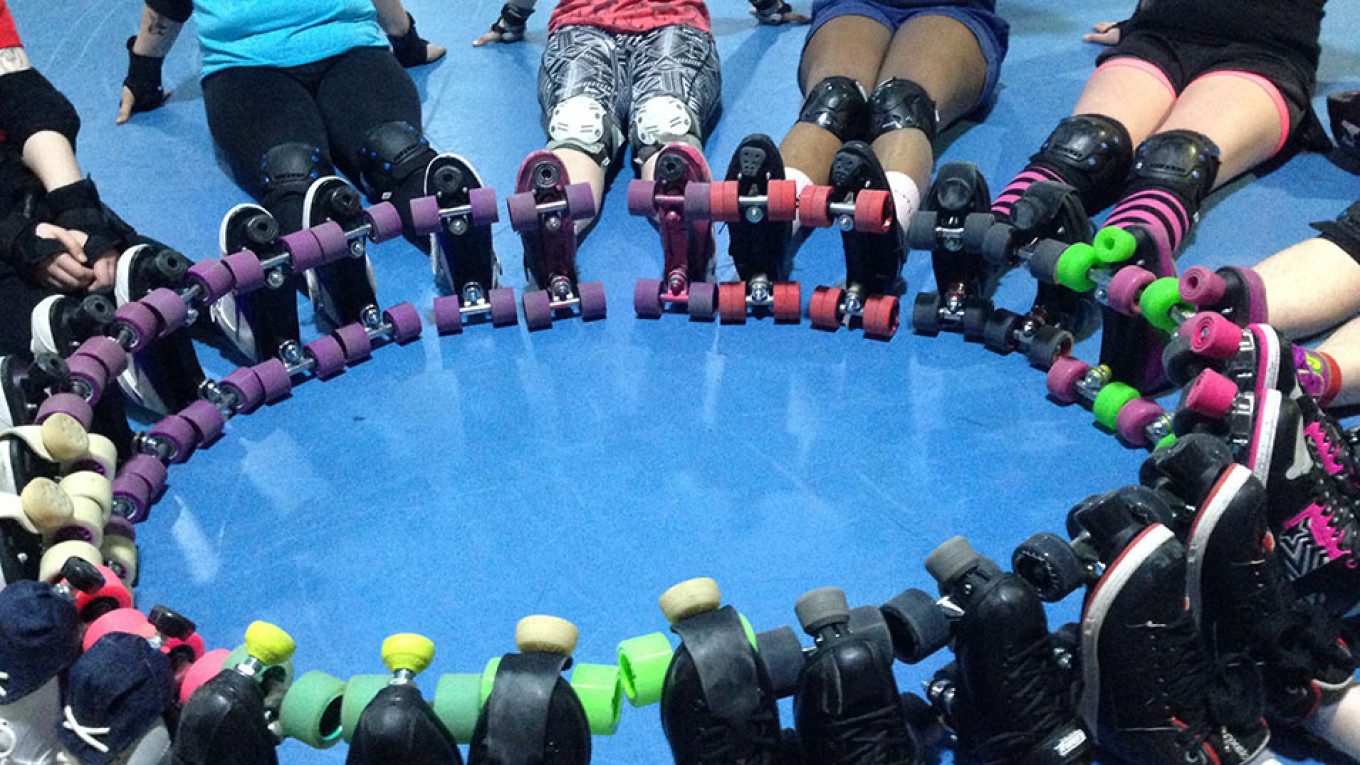
Recruiting new members is an even bigger challenge. While both teams want to bring the sport to greater numbers in Russia, exposure can come at a price.
“Every year, our recruitment posts on social media generate a discussion,” Yuriyeva says. “In some groups they still say ‘Oh, those lesbians, those feminists, what are they doing?’”
To avoid online harassment, the St. Petersburg league decided to advertise within communities they deemed safe including LGBT, feminist and female athletes’ groups. “It is always men [who respond negatively],” says Yuriyeva. “Never women or kids."
The aggression has some parents concerned. Yulia Borets, co-founder of the Moscow team, remembers what one mother said to her daughter at a training session. “Are you ready for this aggression and pain?”
Parents aside, Borets says most of the women who join roller derby are already on board with feminist principles. As such, they are used to pushback from society.
Ulrike Ziemer, a senior lecturer of sociology at the University of Winchester, says that roller derby “goes against lots of ideas of femininity” with its hits and falls. “It’s still about women’s empowerment. Your whole idea of your body changes."
The sport impacts lives off the track, too. “My legs are bruised often, so you can’t wear mini skirts!” jokes Ziemer, whose roller derby alias — everyone has one — is Nina Nunchucks.
Despite the obstacles, the women are undeterred. “At least we will be strong lesbians and famous ones,” laughs Yuriyeva, known by her teammates as Hulk, though she is quick to add that the team isn’t entirely gay. “Some of our players even have husbands,” she quips.
Abroad, roller derby has seen more men getting involved both off and on the track and in 2007 the Men’s Roller Derby Association was founded.
Could men’s derby make it big in Russia? Ziemer, who has hosted roller derby training camps in Russia, isn’t so sure.“It’s not a complete no. But the time frame might be longer.”
Pavel Fyodorov, whose girlfriend is a regular player, is one of three men who help the St. Petersburg team with score keeping and refereeing. “It’s a great, interesting sport,” he says. “But it’s unusual and hard to understand. And if it’s a woman’s sport, [Russian men] don’t want to."
While men are welcome, "we watch [their behavior] very carefully, ” Yuriyeva adds.
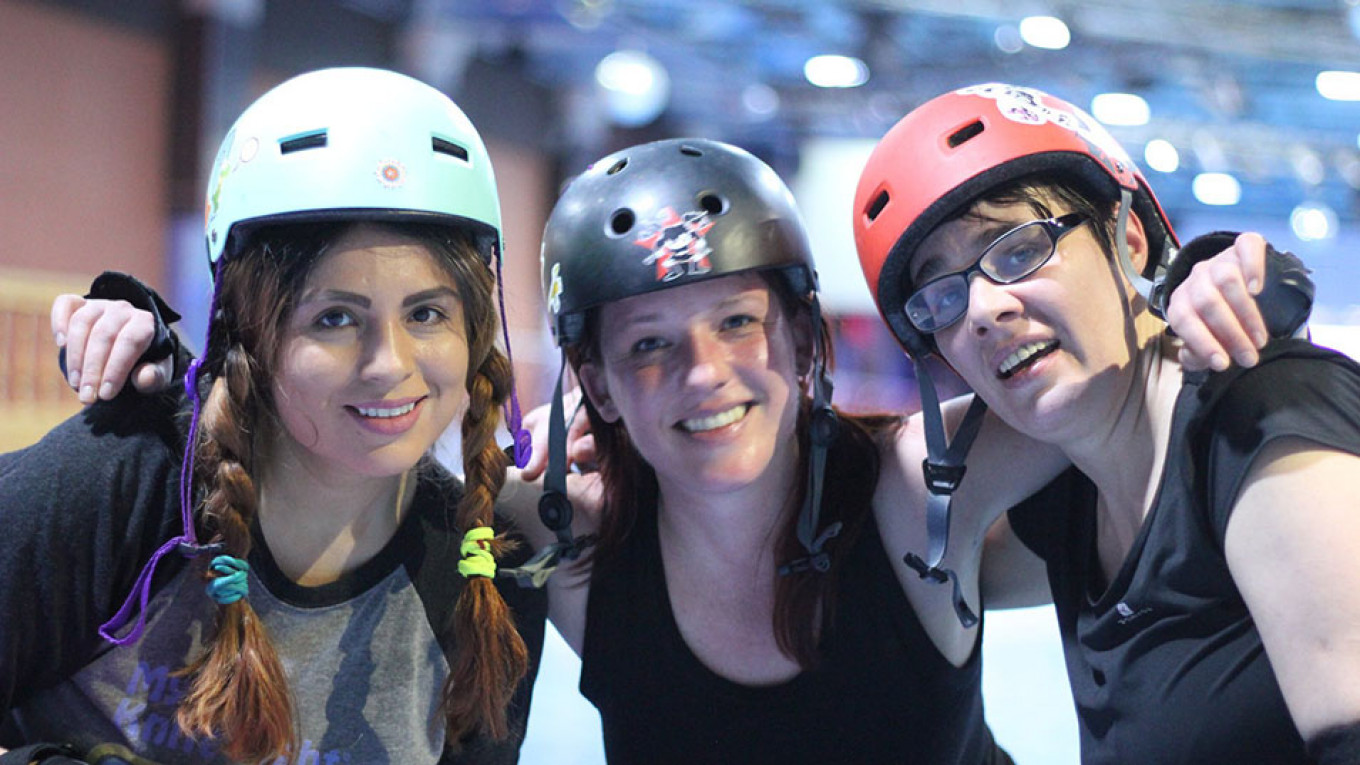
Here to stay
With roller derby growing in stature abroad — the sport now has a women’s World Cup every four years — its fans in Russia are eager to see it become more popular here. Expats are among the most energized to make that happen.
“The plan was to leave Russia after I finished my Masters,” says Talia Kollek, a Canadian kindergarten teacher in St. Petersburg. “But I decided to stay. Sometimes I forget why I’m here, but then I come to practice and I remember."
“[Roller derby] is finally a space, where I can come as I am,” says Aurelie, 34, a French teacher who declined to give her last name. “The first two years I was here, I encountered many situations when people told me I was not the standard. I had the feeling that I never fit.”
Larissa, an African-American skater from Tennessee who skates with the Moscow team, echoes that sentiment. “I’m usually hesitant to try new things in Russia,” she says. “People laugh and stare and yell things at me in public places all the time.” With roller derby, “I could feel like everyone else and not be treated like a freak."
Beyond regular training sessions, both teams want to bring their game to the next level. St. Petersburg is focused on meeting higher international standards. Moscow, meanwhile, is working on becoming a better match for the St. Petersburg teams. Plans for inter-city bouts a real ready in motion for next spring.
But Yuriyeva also wants the sport to stay grounded in its core principles. “It’s half fun, and half competition,” she says. “But most of all, it’s a safe space.” Keeping that space alive, she says, takes a lot of work. “And a lot of hugs."
A version of this article appeared in our special "Women in Focus" print issue. For more in the series, click here.
A Message from The Moscow Times:
Dear readers,
We are facing unprecedented challenges. Russia's Prosecutor General's Office has designated The Moscow Times as an "undesirable" organization, criminalizing our work and putting our staff at risk of prosecution. This follows our earlier unjust labeling as a "foreign agent."
These actions are direct attempts to silence independent journalism in Russia. The authorities claim our work "discredits the decisions of the Russian leadership." We see things differently: we strive to provide accurate, unbiased reporting on Russia.
We, the journalists of The Moscow Times, refuse to be silenced. But to continue our work, we need your help.
Your support, no matter how small, makes a world of difference. If you can, please support us monthly starting from just $2. It's quick to set up, and every contribution makes a significant impact.
By supporting The Moscow Times, you're defending open, independent journalism in the face of repression. Thank you for standing with us.
Remind me later.



